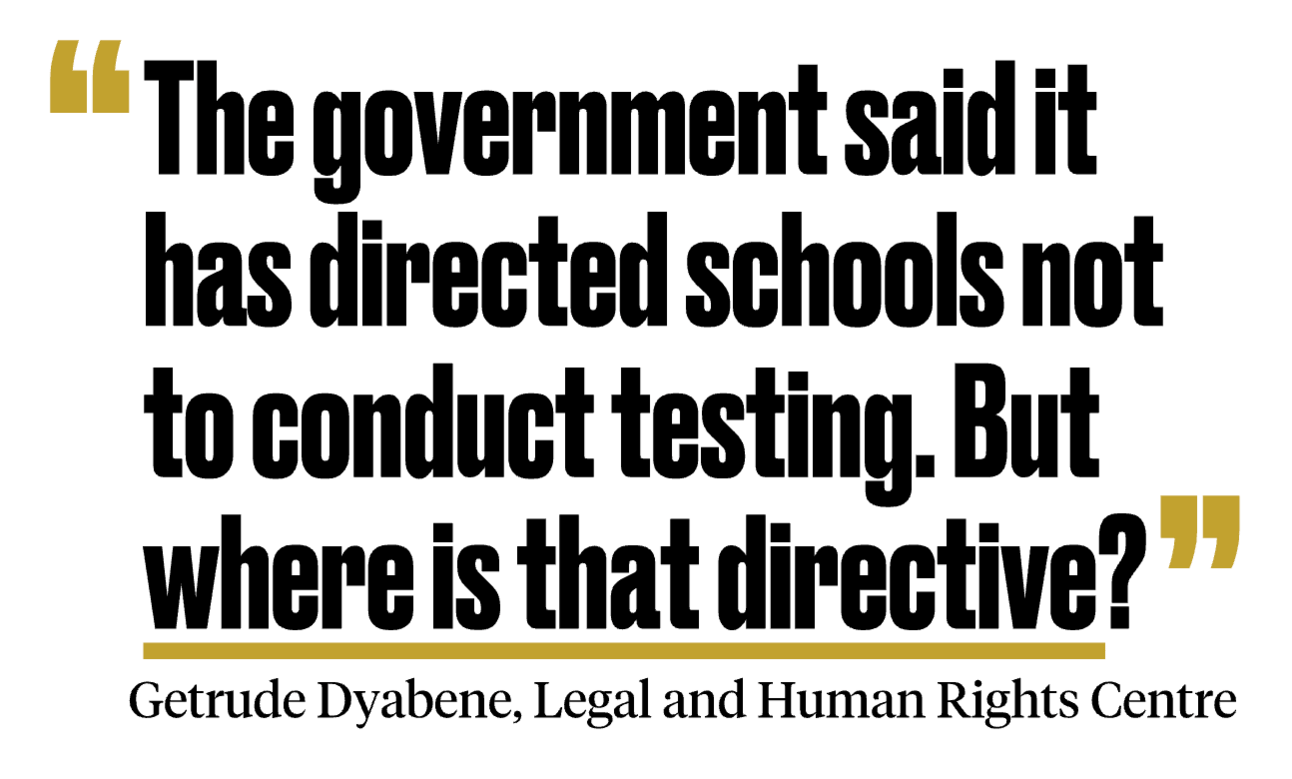
“What the teachers did, it was torturing her, and even shaming her in front of her friends”
Hi {{ First name | there }},
Humiliating, invasive and potentially unlawful.
This week we shone a light on how girls in some east African countries are being subjected to forcible pregnancy testing at school – and kicked out if they’re found to be carrying a child.
African charters on children’s rights to education, privacy and freedom from discrimination mean schools can’t expel pregnant girls. Coercive pregnancy testing is also considered a human rights violation. These are relatively recent rulings from West Africa’s highest court and a pan-African human rights body.
But that hasn’t stopped teachers from forcibly testing girls like Angella Auma, a teenager from Uganda. Angella was 14 when a teacher started feeling her abdomen and told her that she was pregnant. Before she knew what was happening, Angella had been told to go home and not come back.
We are naming Angella after getting permission from her parents. They want to use her case to draw attention to the practice. “I was stigmatised by the administration of the school,” she told us. “[People] kept on talking wrong about me within the community.”
She is one of many girls in Uganda to have been put through this sort of invasive ordeal. “Teachers examine girls, [touching them] around their bodies,” explained David Mwanga, a legal worker who supported Angella. “They look at the changes of their body, the changes in the breast size.”
Sub-Saharan Africa has the highest rate of adolescent pregnancies of any region in the world, according to UN data. And while Uganda is not the only country where the expulsion of pregnant girls has been an issue, it looked to be making progress when the government brought in a 2020 guideline protecting a girls' rights to remain in school. But Angella’s case shows that established cultural practices can trump government directives.
With her father’s support, Angella mounted a legal challenge and won the right to return to school. But the damage was done – fearing the stigma and shame, she couldn’t face going back.

In theory, her ruling set a legal precedent. But it hasn’t stopped the practice. We know of at least six other Ugandan cases, from the six months since, of girls being expelled in similar circumstances. This shows the challenges to protecting girls’ rights.
In Tanzania, a similar story is playing out. A court challenge against forcible testing and expulsions was upheld in 2022, yet the government has failed to introduce any concrete laws to this effect. Guidance and directives have been issued – but nothing legally binding. The reality for many girls remains unchanged.
“The practice is still ongoing,” we were told by Gertrude Dyabene, from the Legal and Human Rights Centre. “The government said they have directed schools not to conduct pregnancy testing for girls. And we are like, ‘Okay, where is that directive? Is there a letter?’”
The story is the latest in our Global Health team’s ongoing effort to investigate the rights of girls and women around the world. In November we revealed how the Ugandan government had made a secretive deal with a former Trump official who helped push through a 34-country declaration saying there is “no international right to abortion”. Now she wants to roll out a women’s health project in the country using public funds.
In the US, reproductive rights have been at the heart of some of the major developments of recent years – such as the Supreme Court’s 2022 decision that abortion is no longer a federal constitutional right. It’s crucial we continue to investigate issues unfolding around the world, especially in places where there are often fewer people paying close attention.
Factchecked!
Each week we reveal a fascinating fact from our reporting…
Did you know?
HMRC data can be unreliable. The agency misreported the number of prosecutions against tax evasion enablers two years ago.
Find out more
We asked HMRC about this, including how many prosecutions it has conducted recently, and found that prosecutions of tax evasion enablers have dropped by over 75% in the past five years, with fewer than five cases recorded in 2023-2024.
The current Labour government has pressured HMRC to crack down on tax dodging to support its substantial spending commitments – but the new figures have raised concerns about the agency’s commitment to holding enablers accountable.
Read more here.
Mother wins legal bid to speak out about family court ordeal
Last week, we witnessed a heartening win for a mother whose rape allegation was wrongly dismissed by a family court judge. After crowdfunding her own legal challenge, she has won the right to go public with her story.
The woman, whose case was first reported by TBIJ in 2023, wants to speak out in order to drive change in the family court system.
“I know there are other mums like me who are victims of abuse and I want to help them advocate for themselves and become better informed about the family court process and the law,” she said in response to the ruling.
“I have struggled to find any other system where freedom of speech about your own experiences is curtailed in such a way,” the woman said in her application. “Silencing me as a victim of rape, from exercising my right to speak, is causing me emotional distress.”
Although new rules mean that all parents who are going through family court proceedings are allowed to give interviews to the media, they can’t really go public on their own terms. Publicising information about the case could put them in contempt of court.
But a new ruling has changed that, with the judge emphasising how important it is for the woman to tell her own story in her words.
“Whilst the media plays an important role in reporting these issues, hearing directly from victims as to how they have experienced the system and the impact the proceedings have had upon both them and the child can be particularly powerful,” Ms Justice Harris said.
The woman went through intense trauma to prevail in the courts. Back in 2021, a judge dismissed the allegation that her ex-partner had raped her. One report given to the judge, informing the decision, downplayed the allegation as “historical”.
After she appealed the decision, her case was reheard. But it meant she had to relive the whole thing again. Two years after the first trial, the new judge found that she had in fact been raped and domestically abused.
This case is one of the horrific stories we’ve covered in the family courts.
We’ve focussed our attention there because, despite presiding over life-changing decisions every day, it is a distinctly underreported part of the legal system. Because the courts are rightly concerned about protecting the children involved in these situations, the rules around reporting on them are incredibly tight.
We have shown that you can tell these vital stories, help reform the system and still protect the kids. In fact, our reporting has already influenced several parts of the process and contributed to a more transparent and fairer system. This latest ruling is one example, with lawyers and the judge referring to our reporting to explain why it was so important to allow the woman to tell her own story.
She’ll be writing her own piece soon. And when she does, you’ll know where to find it.
What we’ve been reading
🔴 New data centres from some of the biggest tech companies will take water from the world’s driest areas: theguardian.com
🔴 Armed Afghan gangs are kidnapping asylum seekers in Bosnia and Herzegovina, according to this investigation: balkaninsight.com
🔴 Google is helping the Trump administration deploy AI along the Mexican border: theintercept.com
Thanks,
Franz
Franz Wild
Editor




